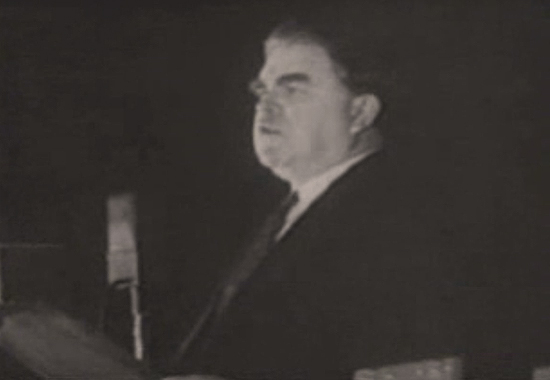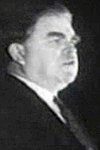|

ORGANIZED WORKERS OF AMERICA - THE
FINEST BULWARK
The Rights of Labor

 |
The United States
Chamber of Commerce, |
the National
Association of Manufacturers and similar groups
representing industry and financial interests
are rendering a disservice to the American
people in their attempts to frustrate the
organization of labor and in their refusal to
accept collective bargaining as one of our
economic institutions.
These groups are
encouraging a systematic organization under the
sham pretext of local interests. They equip
these vigilantes with tin hats, wooden clubs,
gas masks and lethal weapons and train them in
the arts of brutality and oppression.
No tin hat brigade
of goose-stepping vigilantes or bibble-babbling
mob of blackguarding and corporation-paid
scoundrels will prevent the onward march of
labor, or divert its purpose to play its natural
and rational part in the development of the
economic, political and social life of our
nation.
Unionization, as
opposed to communism, presupposes the relation
of employment; it is based upon the wage system
and it recognizes fully and unreservedly the
institution of private property and the right to
investment profit. It is upon the fuller
development of collective bargaining, the wider
expansion of the labor movement, the increased
influence of labor in our national councils,
that the perpetuity of our democratic
institutions must largely depend.
The organized
workers of America, free in their industrial
life, conscious partners in production, secure
in their homes and enjoying a decent standard of
living, will prove the finest bulwark against
the intrusion of alien doctrines of government.
Do those who have
hatched this foolish cry of communism in the
C.I.O. fear the increased influence of labor in
our democracy? Do they fear its influence will
be cast on the side of shorter hours, a better
system of distributed employment, better homes
for the underprivileged, social security for the
aged, a fairer distribution of the national
income?
Certainly the
workers that are being organized want a voice in
the determination of these objectives of social
justice.
Certainly labor
wants a fairer share in the national income.
Assuredly labor wants a larger participation in
increased productive efficiency. Obviously the
population is entitled to participate in the
fruits of the genius of our men of achievement
in the field of the material sciences.
Labor has suffered
just as our farm population has suffered from a
viciously unequal distribution of the national
income. In the exploitation of both classes of
workers has been the source of panic and
depression, and upon the economic welfare of
both rests the best assurance of a sound and
permanent prosperity.
Under the banner
of the Committee for Industrial Organization
American labor is on the march. Its objectives
today are those it had in the beginning: to
strive for the unionization of our unorganized
millions of workers and for the acceptance of
collective bargaining as a recognized American
institution.
It seeks peace
with the industrial world. It seeks cooperation
and mutuality of effort with the agricultural
population. It would avoid strikes. It would
have its rights determined under the law by the
peaceful negotiations and contract relationships
that are supposed to characterize American
commercial life.
Until an aroused
public opinion demands that employers accept
that rule, labor has no recourse but to
surrender its rights or struggle for their
realization with its own economic power.
The objectives of
this movement are not political in a partisan
sense. Yet it is true that a political party
which seeks the support of labor and makes
pledges of good faith to labor must, in equity
and good conscience, keep that faith and redeem
those pledges.
The spectacle of
august and dignified members of Congress,
servants of the people and agents of the
Republic, skulking in hallways and closets,
hiding their faces in a party caucus to prevent
a quorum from acting upon a larger measure, is
one that emphasizes the perfidy of politicians
and blasts the confidence of labor's millions in
politicians' promises and statesmen's vows.
Labor next year
cannot avoid the necessity of a political assay
of the work and deeds of its so-called friends
and its political beneficiaries. It must
determine who are its friends in the arena of
politics as elsewhere. It feels that its cause
is just and that its friends should not view its
struggle with neutral detachment or intone
constant criticism of its activities.
Those who chant
their praises of democracy, but who lose no
chance to drive their knives into labor's
defenseless back, must feel the weight of
labor's woe, even as its open adversaries must
ever feel the thrust of labor's power.
Labor, like
Israel, has many sorrows. Its women weep for
their fallen and they lament for the future of
the children of the race. It ill behooves one
who has supped at labor's table and who has been
sheltered in labor's house to curse with equal
fervor and fine impartiality both labor and its
adversaries when they become locked in deadly
embrace.
I repeat that
labor seeks peace and guarantees its own
loyalty, but the voice of labor, insistent upon
its rights, should not be annoying to the ears
of justice nor offensive to the conscience of
the American people.

More History
|